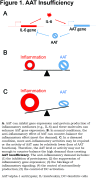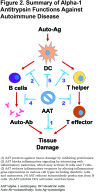Alpha-1 Antitrypsin Therapy for Autoimmune Disorders
- PMID: 30723786
- PMCID: PMC6361478
- DOI: 10.15326/jcopdf.5.4.2018.0131
Alpha-1 Antitrypsin Therapy for Autoimmune Disorders
Abstract
Autoimmune diseases are conditions caused by an over reactive immune system that attacks self-tissues and organs. Although the pathogenesis of autoimmune disease is complex and multi-factorial, inflammation is commonly involved. Therefore, anti-inflammatory therapies hold potential for the treatment of autoimmune diseases. However, long-term control of inflammation is challenging and most of the currently used drugs have side effects. Alpha-1 antitrypsin (AAT) is an anti-inflammatory protein with a well-known safety profile. The therapeutic potential of AAT has been tested in several autoimmune disease models. The first study using a recombinant adeno-associated viral (rAAV) vector showed that AAT gene transfer prevented the development of type 1 diabetes (T1D) in the non-obese diabetic (NOD) mouse model. Subsequent studies showed that treatment with AAT protein prevented and reversed type 1 diabetes. The beneficial effects of AAT treatment have also been observed in other autoimmune disease models such as rheumatoid arthritis and systemic lupus erythematosus. This paper reviews the therapeutic application of AAT and discusses possible mechanisms of action in various autoimmune diseases.
Keywords: alpha-1 antitrypsin; alpha-1 antitrypsin deficiency; autoimmunity; chronic obstructive pulmonary disease; rheumatoid arthritis; systemic lupus erythematosus; type 1 diabetes.
Similar articles
-
In Vivo Analysis of Alpha-1-Antitrypsin Functions in Autoimmune Disease Models.Methods Mol Biol. 2018;1826:143-155. doi: 10.1007/978-1-4939-8645-3_10. Methods Mol Biol. 2018. PMID: 30194599
-
Alpha-1 antitrypsin protein and gene therapies decrease autoimmunity and delay arthritis development in mouse model.J Transl Med. 2011 Feb 24;9:21. doi: 10.1186/1479-5876-9-21. J Transl Med. 2011. PMID: 21345239 Free PMC article.
-
Gene Delivery of Alpha-1-Antitrypsin Using Recombinant Adeno-Associated Virus (rAAV).Methods Mol Biol. 2018;1826:183-196. doi: 10.1007/978-1-4939-8645-3_12. Methods Mol Biol. 2018. PMID: 30194601
-
Therapeutic Potential of Alpha-1 Antitrypsin in Type 1 and Type 2 Diabetes Mellitus.Medicina (Kaunas). 2021 Apr 20;57(4):397. doi: 10.3390/medicina57040397. Medicina (Kaunas). 2021. PMID: 33923873 Free PMC article. Review.
-
Role of alpha-1 antitrypsin in human health and disease.J Intern Med. 2014 Oct;276(4):311-35. doi: 10.1111/joim.12239. Epub 2014 May 13. J Intern Med. 2014. PMID: 24661570 Review.
Cited by
-
The Induction of Alpha-1 Antitrypsin by Vitamin D in Human T Cells Is TGF-β Dependent: A Proposed Anti-inflammatory Role in Airway Disease.Front Nutr. 2021 Aug 12;8:667203. doi: 10.3389/fnut.2021.667203. eCollection 2021. Front Nutr. 2021. PMID: 34458299 Free PMC article.
-
Alpha-1-Antitrypsin Ameliorates Pristane Induced Diffuse Alveolar Hemorrhage in Mice.J Clin Med. 2019 Aug 29;8(9):1341. doi: 10.3390/jcm8091341. J Clin Med. 2019. PMID: 31470606 Free PMC article.
-
Plasma procurement and plasma product safety in light of the COVID-19 pandemic from the perspective of the plasma industry.Vox Sang. 2022 Jun;117(6):780-788. doi: 10.1111/vox.13267. Epub 2022 Mar 17. Vox Sang. 2022. PMID: 35298841 Free PMC article. Review.
-
Serum alpha-1-antitrypsin level in the severity prognosis of systemic lupus erythematosus patients: Systematic exploration of novel biomarker.Biomedicine (Taipei). 2022 Jun 1;12(2):19-30. doi: 10.37796/2211-8039.1297. eCollection 2022. Biomedicine (Taipei). 2022. PMID: 35836976 Free PMC article.
-
SERPINB3, Adult-Onset Immunodeficiency, and Generalized Pustular Psoriasis.Genes (Basel). 2023 Jan 19;14(2):266. doi: 10.3390/genes14020266. Genes (Basel). 2023. PMID: 36833193 Free PMC article.
References
-
- Rogers J,Kalsheker N,Wallis S,et al. The isolation of a clone for human alpha 1-antitrypsin and the detection of alpha 1-antitrypsin in mRNA from liver and leukocytes. Biochem Biophys Res Commun. 1983;116(2):375-382. doi: https://doi.org/10.1016/0006-291X(83)90532-6 - PubMed
-
- Cichy J,Potempa J,Travis J. Biosynthesis of alpha1-proteinase inhibitor by human lung-derived epithelial cells. J Biol Chem. 1997;272(13):8250-8255. doi: https://doi.org/10.1074/jbc.272.13.8250 - PubMed
-
- Molmenti EP,Perlmutter DH,Rubin DC. Cell-specific expression of alpha 1-antitrypsin in human intestinal epithelium. J Clin Invest. 1993;92(4):2022-2034. doi: https://doi.org/10.1172/JCI116797 - PMC - PubMed
-
- Carroll TP,Greene CM,O'Connor CA,Nolan AM,O'Neill SJ,McElvaney NG. Evidence for unfolded protein response activation in monocytes from individuals with alpha-1 antitrypsin deficiency. J Immunol. 2010;184(8):4538-4546. doi: https://doi.org/10.4049/jimmunol.0802864 - PubMed
-
- van't Wout EF,van Schadewijk A,Savage ND,Stolk J,Hiemstra PS. Alpha1-antitrypsin production by proinflammatory and antiinflammatory macrophages and dendritic cells. Am J Respir Cell Mol Biol. 2012;46(5):607-613. doi: https://doi.org/10.1165/rcmb.2011-0231OC - PubMed
LinkOut - more resources
Full Text Sources
Other Literature Sources
Research Materials
Miscellaneous


